新概念2lesson1讲义_图文
新概念英语2 Lesson1课件(共60张PPT)

Seatbelt = safety belt
• Fasten your seatbelt, please!
单词表示抽象概念:
席位
• Win a seat in the congress 赢得一个议会席位 • Lose a seat in the congress 丢掉一个议会席位
☆attention n.注意
Last week, I went to the theatre. • 去看戏
• 注意拼写规则: • theatre (Br)= theater (US) • centre = center • metre = meter
Last week I went to the theatre. 译: 上星期我去看戏。 go to the +地点 表示去某地做什么 go to the theatre = go to the theatre to see a play去剧场看戏 go to the cinema =see a film去电影院看电影
I had a very good seat. The play was very interesting. I did not enjoy it. 我的座位很好戏很有意思无法欣赏。
interesting adj .引起兴趣的,有趣的 eg: This man is very interesting. The book is so interesting that I do not want to put it down. interested adj. .对…感兴趣的 be interested in sth/ doing sth eg. I am interested in sports. Professor Qiao is very interested in collecting stamps. enjoy v.享受…之乐,欣赏,喜爱 enjoy doing sth enjoy swimming 喜欢游泳。 How did you enjoy your trip 旅行如何? enjoy one's dinner 饭吃得津津有味。
新概念第二册Lesson1 A private conversation详解

Lesson1 A private conversationprivate adj. 私人的conversation n. 谈话theatre n. 剧场,戏院seat n. 座位play n. 戏loudly adv. 大声地angry adj. 生气的angrily adv. 生气地attention n. 注意bear v. 容忍business n. 事rudely adv. 无礼地,粗鲁地Last week I went to the theatre. I had a very good seat. The play was very interesting. I did not enjoy it. A young man and a young woman were sitting behind me. They were talking loudly. I got very angry. I could not hear the actors. I turned round.I looked at the man and the woman angrily. They did not pay any attention. In the end, I could not bear it. I turned round again. "I can't hear a word!" I said angrily."It's none of your business," the young man said rudely. "This is a private conversation!"参考译文:上星期我去看戏. 我的座位很好, 戏很有意思, 但我却无法欣赏. 一青年男子与一青年女子坐在我的身后, 大声地说着话. 我非常生气, 因为我听不见演员在说什么. 我回过头去怒视着那一男一女, 他们却毫不理会. 最后, 我忍不住了, 又一次回过头去, 生气地说 : “我一个字也听不见了!”“不关你的事, “那男的毫不客气地说, “这是私人间的谈话!”美音:肯定I can否定I can't,它的/t/是吞进去的, 在读音上很难区别, 只能根据上下文来定The writer could not bear it. He could not ______ it.a. carryb. sufferc. standd. liftbear 忍受=standsuffer 遭受,忍受 (精神或肉体上)痛苦,suffer后面必须加一种痛苦I suffer the headache.(肉体上的痛苦)He often suffers defeat.(精神上的痛苦)(defeat n. 失败)单词:1 a.私人的:______________2 n.谈话:______________3 n.剧场,戏院:______________4 n.座位:______________5 n.戏:______________6ad.大声地:______________7a.生气的:______________8ad.生气地:______________9n.注意:______________10v.容忍:______________11n.事:______________12 ad.无礼地,粗鲁地:______________ 词组:默写课文:。
新概念二第一课课件Lesson 1 A private conversation

4. seat n.座位 v.安排坐下,使就坐 have a seat/take a seat 就座 (比sit down更有礼貌) have a good seat 有一个好位置 辨析:seat/sit seat只做及物动词,sit可做及物动词也可做 不及物动词 be seated 坐着,坐下;位于
新概念英语 二
welcome
主讲老师:Arthur
新概念英语二
新概念英语第二册共计96课,分4个单元(每24课一 个单元)前两个单元是对新一语法的操练和重现;第三 个单元较难,是一些复合句,第四个单元为复习单元, 每单元有一个综合考试。 新二是我们学习英语的一个过渡,同时也是一个转变。 从一个会说日常英语的人转变成一个敢动笔进行基本写 作的人。以96篇小故事为素材,培养学生听、说、读、 写的基本能力,其优势在于扩充词汇、统揽语法、集合 实践、听说兼修。在掌握第一册基本语法的基础上,由 浅入深逐步讲解语法要点,使学习者轻松掌握枯燥的语 法;通过对句型结构的分析及对短语用法的讲解,使学 习者在真正的听说读写中运用地道的句型。
问题是你想要做什么
二、主语———动词 在这一句型中,动词为不及 物动词及不及物的动词词组。在有的句子中,不 及物动词可以有状语修饰。 1.The sun is rising. 2.I'll try. 3.Did you sleep well?(well做状语,修饰不及物 动词sleep) 4.The engine broke down. 注意:在此句型中, 有少数不及物动词表达被动含义,表达主语本身 所具有的特性,不用被动语态。 1.The book sells well. 2.The window won't shut. 3.The pen writes smoothly.
新概念英语2LESSON1A private conversation
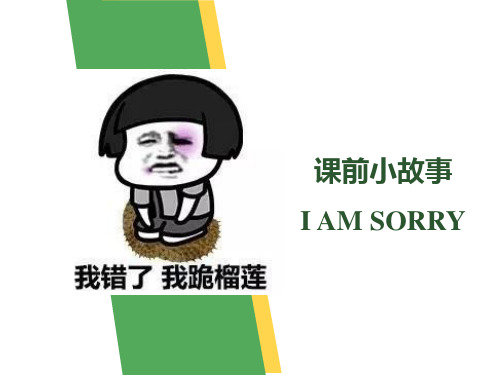
2.Why didn't he enjoy the play?
3.What did the young man say to the writer?
GRAMMAR 一般过去时和过去进行时
Last week I went to the theatre. I had a very good seat. The play was very interesting. I did not enjoy it. A young man and a young woman were sitting behind me. They were talking loudly. I got very angry. I could not hear the actors. I turned round. I looked at the man and the woman angrily. They did not pay any attention. In the end, I could not bear it. I turned round again. "I can't hear a word!" I said angrily.
sometimes, rarely,
never, every day
现在或目 be+现在分 now, still, these
前正在做 词am/is/are days,at this moment,
某事
doing
right now
I am a teacher. I teach English.Do you usually get
新概念英语第二册Lesson1课件
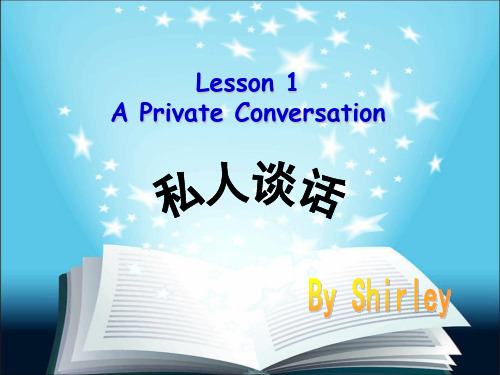
I could not hear the actors.
Key structures and usage
过去进行时:过去某个时间正在进行 或发生的动作 A young and a young woman were sitting behind me.
They were talking loudly.
• • • • • • • • • • • • • • •
【Key structures】 简单陈述句的语序 陈述句一定是有主语,有动词,有宾语,有句号 6 1 2 3 4 5 6 when? Who? Action Who? How? Where? When? Which? Which? What? What? 1 ---主语,一般由名词、代词或名词短语构成,通常位于动词之前,动词必 须与主语一致,即主语决定动词的单复数形式 2 ---谓语,由动词充当 3 ---宾语,一般为名词、代词或名词短语 4 ---副词或介词短语,对方式或状态提问,往往做状语 I like her very much 5 ---地点状语,一般在方式副词之后,时间副词之前 6 ---时间状语,可以放在句首或句末 简单陈述句一定不能少的是主语, 谓语. 如果问何时何地,是一个固定搭配 when and where
• • • • • •
★business n. 事, 生意 ① n. 生意 business man :生意人 do business: 做生意 ② n. 某人自己的私人的事情 It's my business. (指私人的事, 自己处理的 事) • It's none of your business. 不关你的事。
Language points
以下短语中名词前不加冠词:
新概念英语第二册lesson1 (共42张PPT)
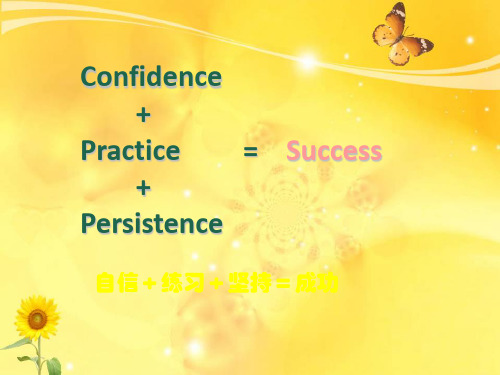
behind prep.&adv. 在…后面 eg. She stood behind a tree.
behind the times 落伍, 赶不上潮流 eg. I am sorry to say, my dear, your clothes are a bit behind the
times. behind someone’s back 暗中的,秘密的 eg: She says nasty things about you behind your back. back of ( in back of ) 在…后面 eg: He hid in back of the house. eg: What is back of his strange behavior?
actor 演员, 男演员 actress 女演员 waiter侍者 waitress女侍者 host主人, 节目主持人 hostess女主人 steward (轮船、飞机)服务员 stewardess 空中小姐
I turned round. I looked at the man and the woman angrily. They did not pay any attention. 我回过头去怒视着那一男一女,他 们却毫不理会。
Let me tell you a story.
time
Last week
People
I
do
Went to the theater
动词过去式
不规则变化
go---went have---had is---was do---did are---were get---got can---could say--said
Loudly:
新概念英语第二册-lesson1课件

12 There are a lot of people at the bus stop. 13 The little boy ate greedily an apple in the
kitchen this morning. 14 She draws beautifully. 15 I like music very much. 16 They built a new school in our village last year. 17 The match ended at four o'clock. 18 She received a letter from her brother last week.
3. The play was very interesting.
[参考翻译] 那场戏剧演得非常有意 思。
[语言点] very 为副词,interesting为 形容词,副词修饰形容词一般放在 其前面。
比如: very hot非常热, quiet easy 十分简单,但good enough 为例外。
have a conversation about sth. 例:Shall we have a conversation
about your vacation ?
同义词:
conversation 无拘束或非正式的 谈话
talk
谈话内容可正式或非正式
chat
闲谈、聊天
discussion (小型的)讨论、商议
like意义要深得多。 enjoy music享受音乐, enjoy dinner享受宴会, enjoy life享受生活
② enjoy doing enjoy swimming 喜欢游泳, enjoy fishing喜爱钓鱼 ③ 一般不可说enjoy sb This morning I enjoyed my English
新概念英语第二册Lesson1(共44张PPT)

4. play n. 戏剧 play v. 玩,扮演play an important role in
5. loudly adv. 大声地 loud adj/adv. 大声的 aloud adv. 出声地,大声地
A dog is barking_________. Speak ________ please.
in private 私下里; in public 公众地
• -How old are you? • -①Sorry, this is a private question. • - ②I forgot it.
1. conversation n. 谈话 have a conversation wi. 注意 pay (no )attention to ··· 注意···
8. bear v.(bore /borne)容忍 n. 熊 近义词:stand /put up with 9. business n. 事;生意,businessman 商人 • Mind your own business! 不要狗拿耗子多管闲事!
me. They were talking loudly. I got very angry. I could not hear theactors. I turned round. I looked at the man and the woman
angrily. They did not pay any attention. In the end, I could not bear it. I turned round again. 'I can't hear a word!' I said angrily. ‘It’s none of your business,' the young man said rudely 'This is a private conversation!'.
新概念2昂立完美讲义lesson1-13教师版.docx

Lesson 1 A private conversation理解couldn ’ t I hear the actors?Because the young man and woman were talking loudly.2. Do you think the young man understood me before answeringconversation ” ?“ This is a private No, I don’ t.解1. private: adj.私人的.Don’t tell the other s, because this is privateprivate school私立学校反:public school Stanford University:斯坦福大学,美国著名私立大学: in private私下里;反:in public 公立学校公众地. He supported the plan in public, but in private he knew it was not good.文化:但被道年收入等自己不愿意回答或者不便回答的,可以使用private -How old are you?-Sorry, this is a private question./ I forgot it.2. conversation: n. informal talk非正式会构: have a conversation with sb内容可以正式的,也可以私人的展: dialogue,可以指正式的国家与国家之的会。
chat 聊,就是北京人的“侃” ,的是无关要的事。
gossip 嚼舌,道短3. theatre: n.院、院. Last week, I went to the theatre.去看an open-air theatre露天Shanghai Grand Theater:上海大院4. seat:n. a place to sit in座位: take a seatgive one’s seat to⋯ .座某人文化: Sit down, please. (命令性) --Take your seat, please. (一般性 ) --Be seated, please. (更礼貌、正式)5. play: n.. Shakespeare was famous for his plays.展: drama/opera/musical: role play:fair play:公平比6. loudly: adv.大声地(). A dog is barking loudly根: loud: adj.大声的. The music is too loud, please turn it down.adv.洪亮地(褒). Speaker louder, I can’t hear you.7. angry: adj.生气的. 我很生气。
新概念英语第二册第一课(包含课文、练习及答案)
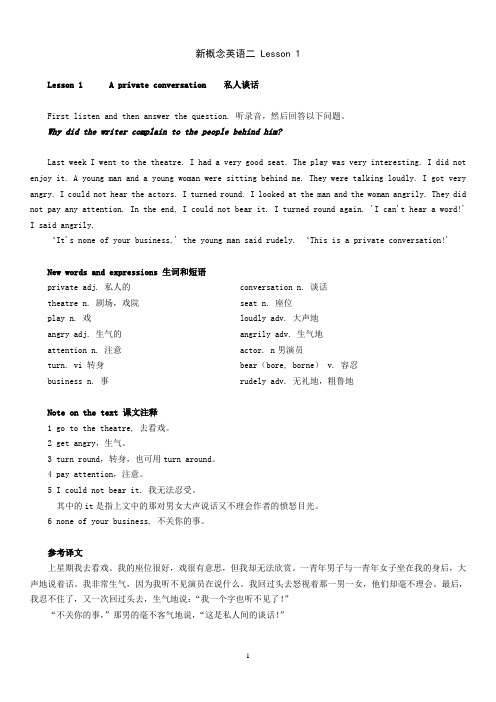
新概念英语二 Lesson 1Lesson 1 A private conversation 私人谈话First listen and then answer the question. 听录音,然后回答以下问题。
Why did the writer complain to the people behind him?Last week I went to the theatre. I had a very good seat. The play was very interesting. I did not enjoy it. A young man and a young woman were sitting behind me. They were talking loudly. I got very angry. I could not hear the actors. I turned round. I looked at the man and the woman angrily. They did not pay any attention. In the end, I could not bear it. I turned round again. 'I can't hear a word!' I said angrily.‘It's none of your business,' the young man said rudely. ‘This is a private conversation!'New words and expressions 生词和短语private adj. 私人的 conversation n. 谈话theatre n. 剧场,戏院 seat n. 座位play n. 戏 loudly adv. 大声地angry adj. 生气的 angrily adv. 生气地attention n. 注意 actor. n男演员turn. vi 转身 bear(bore, borne) v. 容忍business n. 事 rudely adv. 无礼地,粗鲁地Note on the text 课文注释1 go to the theatre, 去看戏。
新概念英语第二册 第1课 (共19张PPT)

get 是逐渐变得的意思,接近become e.g. During the night, it got terribly cold.
4. I couldn’t hear the actor.
hear sb. 听见某人说话 hear from sb. 收到某人来信 hear of sb./sth. 知道某人(某事) hear about sth. 听说、得悉某消息 e.g. I can’t hear you.
summary writing.
1、where did the writer go last week? 2、did he enjoy the play or not? 3、who was sitting behind him? 4、were they talking loudly ,or they talking quietly ? 5、could the writer hear the actors or not? 6、did he turn around or not? 7、what did he say? 8、did the young man say ,“the play is not interesting”or did he say ,“this is a private conversation”?
New words
private
adj.私人的 personal. a private company; private life
conversation
n.谈话 talk have a conversation with sb. e.g. I had a quiet conversation with my closest friend. v. converse交谈
新概念英语第二册Lesson1Lesson2完整版

pay no attention pay little attention pay close attention pay more attention
不注意 有点注意 密切注意 更多注意
Why did the writer complain to the
people behind him?
Because they were talking loudly
Summary Writing
• 1、Where did the writer go last week? • 2、Did he enjoy the play or not? • 3、Who was sitting behind him? • 4、Were they talking loudly ,or they talking quietly ? • 5、Could the writer hear the actors or not? • 6、Did he turn around or not? • 7、What did he say? • 8、Did the young man say ,“the play is not interesting”
• 'It's none of your business,' the young man said rudely. 'This is a private conversation!'
Explain the text
1.重点短语:go to the+地点 表示去某地干嘛 eg: in hospital 住院 in the hospital 去医院 go to the school 去学校 go to school 上学 表明你的身份一定是学生,是去 上学的,而加了定冠词the之后表明你的身份不定了。 相同的还有church和hospital等。
新概念2昂立完美讲义Lesson1-13教师版

Lesson 1 A private conversation阅读理解1.Why couldn?t I hear the actors?Because the young man and woman were talking loudly.? 2. Do you think the young man understood me before answering “This is a private conversation”No, I don?t.单词详解1. private: adj. 私人的e.g. Don?t tell the others, because this is privateprivate school 私立学校反义词:public school 公立学校Stanford University: 斯坦福大学,美国著名私立大学词组:in private 私下里;反义词:in public 公众地e.g. He supported the plan in public, but in private he knew it was not good.文化:但被问道年纪收入等自己不愿意回答或者不便回答的问题时,可以选择使用private-How old are you?-Sorry, this is a private question./ I forgot it.2. conversation: n. informal talk 非正式会谈结构:have a conversation with sb 内容可以正式的,也可以私人的扩展:dialogue 对话,可以指正式的国家与国家之间的会谈。
chat 闲聊,就是北京人说的“侃”,说的是无关紧要的事。
gossip 嚼舌头,说长道短3. theatre: n. 剧院、戏院e.g. Last week, I went to the theatre. 去看戏an open-air theatre 露天剧场Shanghai Grand Theater:上海大剧院4. seat:n. a place to sit in 座位词组:take a seat. 让座给某人give one?s seat to …文化:Sit down, please. (命令性)--Take your seat, please. (一般性) --Be seated, please. (更礼貌、正式)5. play: n. 戏剧e.g. Shakespeare was famous for his plays.扩展:drama/opera/musical词组:role play:对话练习fair play:公平比赛6. loudly: adv. 大声地(贬义词)e.g. A dog is barking loudly词根:loud: adj. 大声的e.g. The music is too loud, please turn it down.adv. 洪亮地(褒义词)e.g. Speaker louder, I can?t hear you.7. angry: adj.生气的e.g.我很生气。
新概念英语第二册第1课ppt课件

ahead of : 在...前面 (+时间、位置)(动态的行为) ahead of time He goes ahead of me.
可编辑课件
14
课文讲解
______ did the writer feel? Angry. a.Where b.Why c.How d.When
10
单词讲解
★bear(bore,borne) v. 容忍 bear,stand I can't bear/stand you endure:忍受,容忍 put up with :忍受 I got divorced(离婚).I could not put up with him bear/stand/endure忍受的极限在加 大
可编辑课件
3
Text 课文
A private conversation Last week I went to the theatre. I had a very good seat. The play was very interesting. I did not enjoy it. A young man and a young woman were sitting behind me. They were talking loudly. I got very angry. I could not hear the actors. I turned round. I looked at the man and the woman angrily. They did not pay any attention. In the end, I could not bear it. I turned round again. 'I can't hear a word!' I said angrily. 'It's none of your b可编u辑s课i件ness,' the young man 4
新概念英语第二册第一课(包含课文、练习及答案)
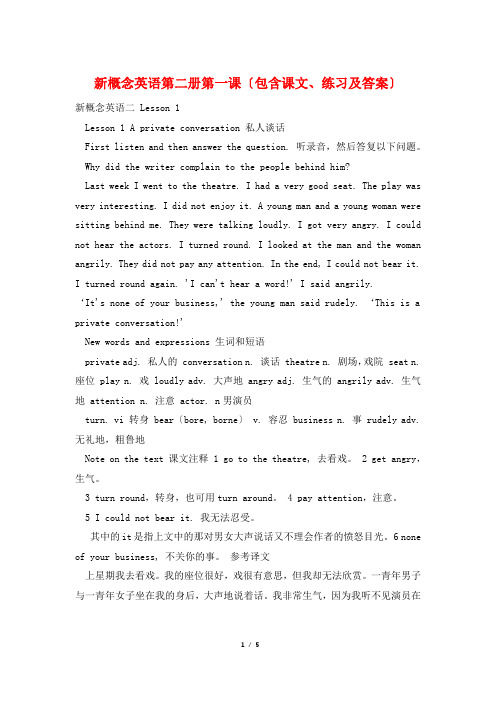
新概念英语第二册第一课〔包含课文、练习及答案〕新概念英语二 Lesson 1Lesson 1 A private conversation 私人谈话First listen and then answer the question. 听录音,然后答复以下问题。
Why did the writer complain to the people behind him?Last week I went to the theatre. I had a very good seat. The play was very interesting. I did not enjoy it. A young man and a young woman were sitting behind me. They were talking loudly. I got very angry. I could not hear the actors. I turned round. I looked at the man and the woman angrily. They did not pay any attention. In the end, I could not bear it.I turned round again. 'I can't hear a word!' I said angrily.‘It's none of your business,' the young man said rudely. ‘This is a private conversation!'New words and expressions 生词和短语private adj. 私人的 conversation n. 谈话 theatre n. 剧场,戏院 seat n. 座位 play n. 戏 loudly adv. 大声地 angry adj. 生气的 angrily adv. 生气地 attention n. 注意 actor. n男演员turn. vi 转身 bear〔bore, borne〕 v. 容忍 business n. 事 rudely adv. 无礼地,粗鲁地Note on the text 课文注释 1 go to the theatre, 去看戏。
新概念英语2 lesson1
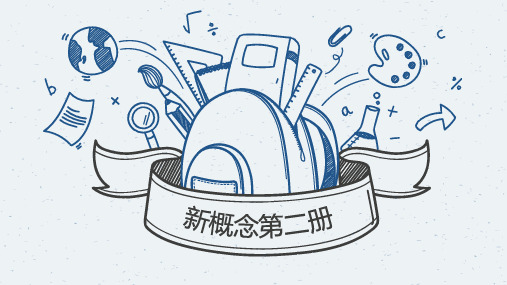
private adj.私人的
① adj.私人的 private life 私生活 private school 私立学校 ②adj.普通的 private citizen 普通公民 eg. I'm a private citizen.
public adj.公众的,公开的(private的反义词) public school 公立学校 public letter 公开信 public place 公共场所 privacy n.隐私 It's a privacy.这是我的隐私!(不愿让别人知道的)
6.In the end,I could not bear it. in the end最后,终于,表示一段较长的时间之后或某种努力之后 7.I can't hear a word!
hear a word of sb.(a word 等于一句话) He didn't say a word.
8.It's none of your business. one's business指某人(所关心的或份内)的事 It's none of your business./None of your business./It's my business.不关你 的事 none相当于not any或no one,但语气较强
简单陈述句的语序 陈述句一定是有主语,有动词,有宾语,有句号 1.主语:一般由名词、代词或名词短语构成,通常位于动词之前,动词必须与主语一 致,即主语决定动词的单复数形式 2.谓语:由动词充当 3.宾语:一般为名词、代词或名词短语 4.副词或介词短语:往往作状语 5.地点状语:一般在方式副词之后,时间副词之前 6.时间状语:可以放在句首或句末 简单陈述句一定不能少的是主语,谓语 如果问何时何地,是一个固定搭配 when and where
